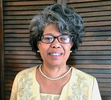Robin R. Foster's Blog, page 4
December 8, 2023
Getting Past the 1870 Census: An Example

Many people are still learning that it is possible to find records of an ancestor before the 1870 Census. Even fewer realize how to analyze the 1870 Census to learn more. It is even more difficult for a significant number of African Americans because only free people were enumerated before 1870. Below you will find an example of how analyzing your family or those nearby in 1870 can help you discover more clues.
1870 household
This is the index of the 1870 Census for Pettus Wales Chick and his family in Goshen Hill, Union County, SC. Review the household both on the index and on the original image for everyone in the household. You will need to enlarge the original image to see the details better. This is the household of Pettus in 1870:
1. Pettis Chick, 63, male white merchant, real estate value of $2,400, personal $4,000
2. Sarah Chick, 54, a white female, keeps house
3. Ann Flowers, 60, white female, without occupation
4. S. Henderson, 38, white female, without occupation
5. Elizabeth, 13, white female, at home
People of color have been enumerated on both sides of Pettus' household. In addition to that, the net worth of Pettus could mean that he was formerly an enslaver. The people of color living next to him may have been formerly enslaved by him. You have a choice of stepping back further in time in the records or searching for a will to learn more about the relationships listed in the 1870 Census.
Exhaust the historical records
It is always preferable to exhaust the most recent records first because they might mention people further back, and you will be more sure how they are connected. A will for Pettus was discovered. Pettus wrote out his will on March 12, 1876. It is full of rich details about family relationships. His will was probated in 1878.
In 1876, Pettus included Eliza whom he called little Eliza, and her son, Anderson in his will. He did not mention any of his own children. This is the same Eliza and Anderson living next to him.
To learn more, you need to step back each year on the census. Here are the census results:
• 1860 Census - The household includes Pettus, Sarah, and Eliza Maybin (79) His net worth was over $87,000.
• 1850 Census - The household includes Pettus and his wife, Sarah.
• 1850 Census Slave Schedule – Proves Pettus was a slaveholder in 1850.
Now you may wonder how Pettus acquired his wealth. You do not know the name of his father, and the 1840 Census only lists the head of the household. Perhaps there is a will for his father. This is a little easier to do on Ancestry.com because probate records have been indexed. Searching for a will from the individual record for Pettus Chick on Ancestry.com leads to a will that mentions Pettus (1846). Pettus was the son of Dr. Burwell Chick, and Pettus inherited Eliza from his father. It is a mistake to research only people who are the same color because the path of discovery leads to documentation on both colors of people who interacted with each other.
Check the wills
In conclusion, Eliza lived next door to Pettus Chick in 1870. Pettus left property to Eliza and Anderson in his 1876 will. Searching for a mention in the will of parents of Pettus led to finding a mention of Eliza in Feb 1846. This illustrates how researching the family group and neighbors living nearby on the 1870 Census can help you find documentation as you step back in time. You could also choose to research Sarah to discover who her parents are, or you could research other members of her household in 1870.
Be sure to follow me on Facebook where I will reveal Smashwords "2023 End of the Year Sale" where you can purchase my books. This book, My Best Genealogy Tips: Quick Keys to Research Ancestry Book 2, will be available as part of a promotion on Smashwords through January 1 as part of their 2023 End of Year Sale! This is a chance to get my book, along with books from many other great authors, at a discount so you can get right to reading.
You will find the promo here starting on December 15, so save the link:
https://www.smashwords.com/shelves/promos/
Please share this promo with friends and family. You can even forward this email to the avid readers in your life!
Thank you for your help and support!
Happy reading!

December 6, 2023
Introduce Genealogy to the Next Generation: EmulateMe and FamilySearch
Can you believe this is an emulation of Mrs. Otis Edna Tucker Vance, my grandmother, created entirely by AI? I created my #Avatar using #EmulateMeAI. It’s so realistic, watch it here: ,https://app.emulateme.ai/share/656e681fad4502e933a5d4e2
It seems that everybody has got the Ai rave. I have been watching for a real incentive. Well, guess what! EmulateMe has got just what you need to get your children and grandchildren going with family history. I had been talking with the founder of EmulateMe, Ariel Mathov, who is an associated organization to FamilySearch. You can make emulations if you import FamilySearch.
Chatting with your family member
I like the feeling of you chatting with your family members, interacting with their information in a new way, and YES, watching them and listening to them. I have already made four or more.
You need audio, a photo, and you can use the Script function to type in what you want it to say. You save it as an .mp4 and show it to your children or grandchildren. If you start with a chat, you ask your emulator questions. You can save those as well. Saving functions are Facebook, Twitter, What's App, copy the URL, or save it to your computer.
Basic tutorial
First step: Sign up with a FamilySearch account at https://app.emulateme.ai/. Here is the sign up if you do not have an FamilySearch account: FamilySearch Sign Up
It is really important to sign up with a FamilySearch account to enable the import of information. If you have trouble, here is a knowledge document: How do I create a free FamilySearch account
Where it says "New emulation" name your person. Put a date of birth and death.

Add voice clips. Make it at least 1 minute. Record your own voice and/or audio files.
Record your own voice Upload your audio Import audio files from FamilySearch Continue to next step
Add a photo.
Upload a photo Import from FamilySearch Continue to next step
Add documents.
Upload a document - .txt or .pdf Answer questions Import documents from FamilySearch
Select Script or Chat.
Script - You can tell your emulation exactly what you want said. Chat
Chat: Ask a question, and get an answer with text, audio, video. Share.

The emulations are stored on EmulateMe. in your account for later use. I used chat to make the video above. Come to Genealogy! Just Ask! and get the 10% promocode.

December 1, 2023
Why Should I Search for the Census Every Ten Years?

Are you having a challenge with researching one of your ancestors? Have you widened your search to include siblings and children? Sometimes this can lead you straight back to discovering more about your ancestor. One way to begin a sketch of ancestors’ lives is to follow them and their entire family group each census year. The clues that you find can link you to additional records.
Census Tracker
Use the US Census Tracker to record the names of each family group beginning in 1950 or with the most recent census where they first appear. Trace each family member back every census year until they no longer appear. Mark the age recorded on the census each year that you locate them. Using this tool will ensure that you do not miss searching for all of
the extended family members each year that they would have been enumerated.
This will give you a feel for who is living where and with whom. Pay close attention to neighbors, property owners, and places of birth for starters as these details become useful later as you work to glean more information from different record types.
Location
Stay focused on the research question you are trying to answer, and record the places (city, county/parish, state) where your family lived. The eventual quest will be for records that hold the answers that you seek, but you must understand that records are tied to the location where they were generated. This is why tracing your family on the census every ten years is helpful.
Discoveries
Searching the census in this manner may bring attention to members of the family that were never discussed. Sometimes there were children who died before maturity but were enumerated on the census. On the 1900 US Census a child, Mamie Vance, appears, however, neither of the Vance descendants remember her.
This is also the only census where Lafayette appears with his wife, Nunia. She died this same year after their daughter, Laura, was born. Ancestors can also show up married to different spouses that you had no knowledge of beforehand. You will come to understand the birth order of children and any naming patterns that may have existed.
Age differences
Using the census tracker will help you to understand that all the details provided on the census ages are among the least accurate (names and spellings of names vary too). Ages can vary for many reasons. Some are:
• ages were changed to qualify for work or military service
• no recollection of birth date or age
• erroneous information was provided by neighbor or friend
Let us continue proving the case for an extensive search of the census. As a reminder, the 1890 Census is only available in fragments.
Birth order
One of the most useful but less obvious benefits from the census is that it can help you understand the birth order of the siblings of your ancestor. Why is birth order so important? Suppose your female ancestor was born in 1881. She would not appear on a census until 1900. By then she could be married, and without a maiden name it is more difficult to locate parents. So now, how would you proceed to find her parents? Here are two scenarios:
• If you know the names of any older siblings, search the census for them in 1880 to hopefully find their parents.
• Search the death certificates of each of the siblings to see if the parent’s names are mentioned.
Knowing the birth order of children is also important because as you research earlier census records, you may discover more children at home or children enumerated by a nickname. This can get confusing especially if you find children your family never mentioned. The birth order helps you to identify which children you have recorded, and which children are new discoveries for you. Census records prior to 1850 only the name the head of household, so birth order becomes even more significant
November 29, 2023
How Do I Find a Record That Has a FHL Film Number on Ancestry?

Sometimes you might come across a record the is indexed on Ancestry.com. The record may have a FHL Film Number. Ever wonder how you would find the original? Well, the first thing that you want to do is write down the number. In this example that came from a member of Genealogy! Just Ask!, the number is 991256.
Next, you would go over to the FamilySearch Catalog and search for that number: 991256.
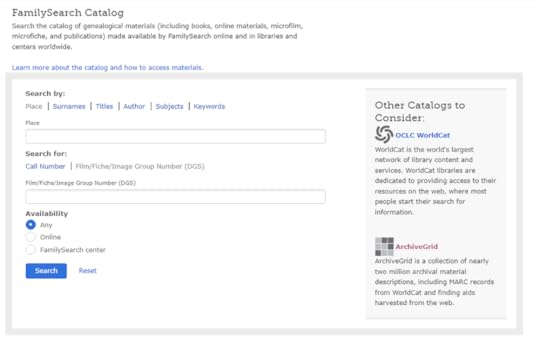
Make sure you select Film/Fiche/Image Group Number (DGS). Then put the number in the space that come up.
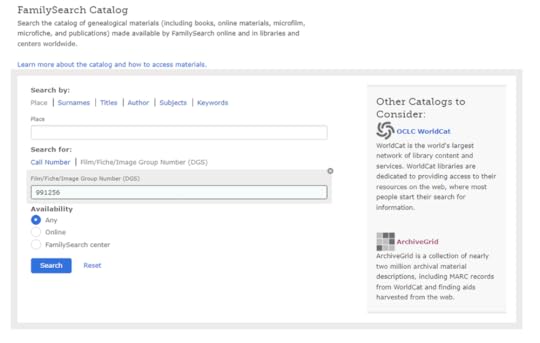
You will be given the following result:

Then click on "Parish Registers for Belhevie, 1624-1854." Now notice you have found the appropriate film number. It is the first flim number at the top. Please read the "About this record" which is at the bottom.
The film number has a image number: 8075675, and a format. When you click on the camera with the key, you will notice that you have be at a FamilySearch center or FamilySearch affiliate library.

Click on while you are at a FamilySearch center or FamilySearch affiliate library.

To find a FamilySearch center or a FamilySearch affiliate library: Find a FamilySearch location
November 22, 2023
The Importance of Accurate Family Narratives
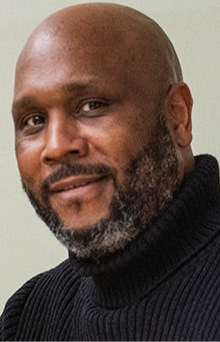
As this is my first post here as a writer on this forum, let me start by introducing myself. My name is Dr. Vincent Alexander Davis. I am a professor of communication studies, an avid (mid-level) genealogist. Interestingly enough, finding out the truth about my paternity led me on an irreversible course to falling in love with genealogy. I am here for all that comes with genealogical research, whether it's the findings that change our lives, or the frustrating brick walls that will inevitably happen. Either way, as the young folks say, I want all the smoke.
Recently, I finished my PhD, and my doctorate focused on the intersectionality between genealogy and communication studies. One major aspect of my work was making the argument that genealogical findings affect how we communicate interpersonally. One area I found where this is true is how it pertains to self-identity. However, I also touched on how finding out genealogical truths can cause people to alter how they communicate with others. One thing that is for certain, when DNA contradicts family stories, conflict is sure to arise. This is why we should pay particular attention to the accuracy of family narratives, especially those narratives that directly affect how we see ourselves
What I mean by that is this: when you engage in genealogical research, in many cases your findings contradict family stories. Think of all the times you may have heard family lore only to think to yourself that something doesn't sound right...you're probably on to something. You see, though every family has a story, just like the game of telephone, the details tend to become muddled the longer these stories are told. In fact, whereas genealogical research benefits from the discovery of of family history narratives, communication researchers (like me) research the other side of these narratives; how they are shaped, presented, and received, and how they influence individuals' self-perception, group identity, and the (accurate) representation of family histories.
Several years back, I helped a friend of mine explore her family history. Whereas I do not ever pretend to know every genealogical research methodology available, I try and be as thorough as possible with the skills I do have. That said, she was telling me about her father being the son of a famous "tough guy" figure from the 60s and 70s. Now keep in mind, the family seemed to have a different story every time I heard it, but it was clear that they were excited about this as they would always tell me that 'grandma said this and grandma said that'. What was clear was that this grandmother had a relationship with this particular 'tough guy', though the depth of that relationship could not be verified...primarily because that narrative came crashing down as the DNA tests came back.
You see, my friend, her father, and her grandmother all did their DNA, but the father's DNA ended up being a match for two half-brothers, and they were not the half-brothers of the 'tough guy'. They all shared a father...who was from Chicago. When the grandmother heard this news, she was adamant that it was the tests that were wrong, and would not come off her story. Well, as they say people lie, DNA doesn't. Even my friend's father accepted his new family! This resonates with me personally because I know what it's like to have to disprove a family narrative, and I also know what it's like to be the recipient of vitriol when genealogical evidence contradicts family narratives (it's NOT fun!).
Anyhow, something about this narrative of having a child by this 'tough guy' resonated with my friend's grandmother. Though the DNA proved her narrative to be false, it just goes to show how easily false narratives can be passed down due to misattributed paternity. Whether the misattribution was intentional or not is irrelevant, it just underscores the importance of getting the story right. We all owe the truth to our descendants...so as you all celebrate Thanksgiving, when you all talk about family, make sure the stories are straight!!
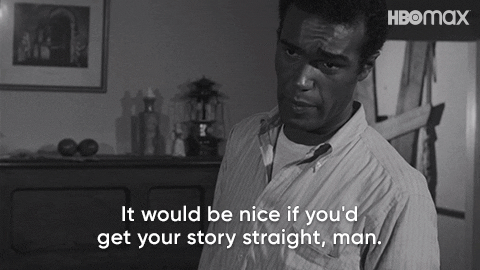
November 21, 2023
"Prayer Journal," Finding My Ancestors Has Always Been a Matter of Prayer

I have been conducting genealogy research since 1985, officially. From the time I was a small child, I was close to my grandparents and I showed a great interest in who their siblings were as well as their children. I would ask questions to get to know their parents. My family always answered my questions.
Doing genealogy officially
By the time I was officially doing my genealogy, my first job was getting what I knew down on a family tree and family group sheets. Boy, did I have so many of them. I did not know anyone on either side who had done a family history, so I did everyone's family group. I feel a strong bond with them now that most of them have passed. I know that they are in paradise. I knew how to pray. Prayer became vital when more and more of my family passed from this earth life.
Next, I started taking oral history interviews on everyone I could. Those interviews filled in the missing gaps. They became the basis of my research. I have found historical documents and they confirm the oral history interviews are true. I prayed about who I should talk to and what I need from them.
People at Church and outside of Church began to ask me for assistance. I knew that I could help them because I knew how to pray. It was fun! I did this, and in 2007, I went on a Family History and Temple Mission with The Church of Jesus Christ of Latter-day Saints until 2014.
Genealogy Just Ask
I would have kept going, but I I had begun Genealogy Just Ask. I also had people in the offline community that I did genealogy research for. I did that for two years. Then I had a massive stroke in 2016. I was not able tell my family that I knew I would be all right, but my husband and daughter are the reason I am still here. Many prayers from many people is also the reason.
I do not regret going through that. I feel Heavenly Father has lead me through to where I am now. I had the stroke in September of 2016. I moved to Joliet, Illinois, and in a wheel chair, I was called to train family history consultants. I saw various physicians during the week. I keep up with my genealogy business as well.
Heavenly Father's Plan for my life
One day I had to meet a neuologist in Chicago. She said she had a test for me to take. I was so nervous. I knew that my genealogy and scripture reading were not affected, but I was lacking when it came to anything else.
I could do little of that test, but she said something to me that only the Lord could have known about me. She said, "There are two things that you will never lose: Your knowledge of genealogy and the scriptures." I felt the confirmation about what she said. I understood what the Lord had done. I used to be the type of person who would do anything. I would have gone back to doing evereverything.
I promised Heavely Father I would do genealogy and read my scriptures in heaven. I now knew what His plan for my life was. We then moved to Fayetteville, NC. It has been eight years since my stroke. I find joy in temple attendance. I meet people the the FamilySearch Center in Fayetteville. My callings at Church are Family History and Temple Work on the ward level and stake.
Join in with me as we practice prayer
I have written five books in the past two years all on genealogy except "Prayer Journal." Prayer has been my running theme. It has brought answers to every problem and sweet peace in the midst of every storm. For those who want experience purchasing a Prayer Journal, we will fill the journal with our own personal prayers to Heavenly Father. Then we will watch them closely to see how they are answered.

One prayer that we can share is the prayer we ask to find that ancestor. How will that be solved? I want to leave you with one example:
I am going to share how was able to learn of the siblings of my great great grandmother, Elenia Coleman Chick. I called my grandmother's cousin in 2012. She was the daughter of Sally Chick Talley. Her Name is Congee Taylor. She lived in New York at the time. She grew up in Newberry County, South Carolina.
She was 96 years old when she passed. When I first spoke to Congee to find out who her grandmother's siblings where, she told me: "Honey, I do not remember anything.." We spoke by phone. She was the last person of that age that could tell me.
The Holy Ghost took over and before I knew it I had responded, "That's okay, because you are going to go to sleep and have a dream and when I call you back, you will be able to tell me all the names of the siblings of your grandmother."
I waited a few days, and I prayed she would have the dream and remember. When I called back, she was excited. She recited the names of her great aunts in birth order. I could not wait to see them on the 1870 and 1880 Censuses. I looked upon the names of great great great grandmother, Sue, and Elenia, my great great grandmother with the children who were home.
I found the name of my great great great granfather, Theophilous Coleman when I had gone to the South Carolina Department of Archives and History to look up land deeds. His name along with my great great grandmother, Elenia, were on a Newberry County land deed.

Recognizing and Overcoming Inconsistencies in Genealogy Research

From "My Best Genealogy Tips: Quick Keys to Research Ancestry Book 2."
It is a good practice to refrain from drawing conclusions about your genealogical findings until you have exhausted a very every avenue of research. The records that you turn up that are not consistent with your current findings or theories to help you know you are successful. How do you feel when your findings cause you to question the opinion you have formed, and what do you do about it? Keep in mind that you rely on historical documents and other people's memories which may create a spotty recount of your ancestor’s life at best. Even the accounts shared by those who lived during the same era can become tainted with time.
Gather all the evidence and pass the baton. Share your interpretation of your findings, but do not lead the next generation into believing everything you share is a cold, hard, and irrefutable fact. It only takes the discovery of one word record like one more child born out of wedlock or a different spouse in the home to change the whole course of events in your family history. You are always on the cusp of that occurrence. Who knows everything about their ancestors like they thought they did when they started?
In a perfect world, all family historians compile research would stand the test of the length of the DNA testing, but that is not possible in every case. If it were, what things might you discover differently about your progenitors? However, that does not mean you should not take your research nor the interpretation of your findings seriously.
With all the many historical records available online today you may feel you have finished with certain lines. Records that were not available at the time you were researching should be reviewed, such as:
· Newer census records
· Vital records (especially death records)
· County/parish records
A death record from 1941 can still reveal information about a person's ancestral line two and three generations back. For example, Henderson and Lucy Nelms were listed in each census going back from 1920 until 1880. One of their children was Ora Nelms Foster, and another was presumed to be her sister, Olean Nelms. For no apparent reason, a desire to search for this family in Memphis, Tennessee, ensued.
The widowed, Olean (married to George Long) was living with his sister, Ora Nelms Foster, in Memphis when she died, and Ora was listed as an informant on Olean's death certificate. Ora gave the name of Sam Bradford as the father of Olean. This entry throws a wrench at twenty years of research on this ancestral line. No one knew or admitted that Henderson was not the father of both Ora and Olean.
In My Best Genealogy Tips: Finding Enslaved Ancestors, I show how I came to know that Lucy Nelms was the mother of Olean Bradford Long. I also showed how Lucy Nelms was once married to Sam Bradford:
A. Name of decedent: Olean Long (search 1940 Census and marriage
B. record)
C. Name of father: Sam Bradford (search census and death records)
D. Name of mother: Lucy Nelms
E. Informant (also sister): Ora Foster
F. Cemetery: Norfolk in Walls, DeSoto County, Mississippi
These types of inconsistency cause you to have to begin all over again searching for other possible missed clues, and that is what will be done in this case. Further research will prove this entry. Our research must be validated or invalidated and not just overlooked.
Fortunately, the cemetery where Olean is buried was revealed. Walls. Mississippi was the birthplace of her formally enslaved mother, Lucy. Norfolk could very well be the family burial ground. No matter where these clues lead, the researcher’s interpretation will be shared as well as all evidence, conflicting or otherwise.
November 9, 2023
Things Genealogy Beginners Forget

It does not take too long to get overwhelmed and forget some of the basics of being a well-rounded genealogy researcher. If you are beginning or feel like you are starting over, review the reminders below which are sometimes easily overlooked. Save JPEGS It used to be those photos were stuffed in the sock drawer without a name or a date on the back. Today you take tons of pictures on your phone that stay there. Family member’s photos become treasures after the person passes away. You have taken snapshots that are trapped on your phone. Upload the pictures and share them with family members so that everyone can have a copy. Do not allow your family to be trapped as jpegs. Share them on Box or Dropbox and invite your family members. You can even put them on your FamilySearch Memories.
Talk to family members Make it easy for your family members to know who the family historians are so they know who to call on when they want to learn more about their heritage. Also, sit down and record or video the folks in your family that can help you make connections to the past before it is too late. One of the biggest regrets family historians openly admit is not asking the right questions before their loved ones passes away. Transcribed recordings make it easy to access clues for family history research. In addition, questions for interviewing relatives will help get your family members to open up and possibly share new stories.You count too If you neglect to tell the story of anyone in your family, most likely you will forget that the most important history to preserve is your own. If you do not tell it, someone else will, you may not like their version. Take time to make a permanent record of your memories, photos, and records. Try FamilySearch Memories.
Family Heirlooms
A hope chest, antique furniture, or wedding bands are family treasures that have storytelling of how they came into your family. Perhaps they were acquired by an ancestor at a great cost or sacrifice. Tell the story and include a photo. Unfortunately, too many family treasures get tossed to the curb because the stories behind them faded with time. At one time, they were precious to your family.
House history Homes have a genealogy that you can trace. Know where your ancestor’s homestead is? Chances are several generations grew up there - if those walls could talk! Share the stories that came down to you and trace the records to show the details about how the property was acquired.

Involve your family Whether young or old, discovering your ancestors should be a family affair. Plan to enjoy family activities together. Remember, the rudiments of research may not be the thing that excites most of the people in your family to participate in family history. Make it fun for everyone and keep what you do a short and memorable experience.See Research Wiki: Beginners

November 6, 2023
What Have You Uploaded as Memories?

I love to go to the FamilySearch Center. People may wonder what you can do that stands for family history. Families have a lot of photos and documents that they can upload to FamilySearch Memories. I thought it would be great to tell you about all kinds of Memories that you might not have seen uploaded before.
You can add Memories on FamilySearch.org: How do I upload Memories to FamilySearch? You can also visit the FamilySearch Center where you can ask a volunteer to show you how to upload.
We handle a lot of documents and photos over the course of our lives. What do you do with them? I was so excited because Genealogy! Just Ask! Group had listed many different kinds of Memories. Can you think of any that are not here? Put it below in the comments section. I will add it to the list in the group.
Newspapers
Census
Military records
Birth certificate
Marriage certificate
Death certificate
Religious records
Medals
Report Card
Poem
Journal entries
Awards
Letters
Yearbook photos
DNA links
Postcards
Court documents
Conservatorship paperwork
Fishing license
Sound recordings
Funeral talk
Stories
Recipe book
Ship logs
Google Maps
Paintings
Funeral guest book
Social Security Card
Embroidered items
Job offer
Bullet-ridden photos
Worker compensation
Deeds
Land records
FBI file
Bicycle license
Tax collector letter from Governor
Souvenirs
Western Union
Covid documents
Maybe this has sparked your memory of what you can include.
November 3, 2023
Berkshire Hall & Epping Press' Replay of My Best Genealogy Tips: Finding Formerly Enslaved Ancestors
Wendy Aris, of Berkshire Hall & Epping Press, was the host of this great video called Robin R. Foster - My Best Genealogy Tips: Finding Formerly Enslaved Ancestors. It has been about eleven months since I was on the video. Some of you who need this have not seen it.
My driving force for authoring this book was I wanted descendants of formerly enslaved ancestors to know to have an easier time of genealogical research.
Research Wiki : You only need to know where (county or parish, state) your ancestors lived to find historical records. Be open-minded. Create a timeline: Reveal wholes in your research. Bibliographies have historical records.Research Wiki
You do not need to wait on anyone to find where the historical records are. Let's look at Abbeville County, South Carolina.
Go to the Research Wiki . Search "Abbeville County, South Carolina." You should be here . See all the historical records. Always check the boundaries. Greenwood County, South Carolina was created from Abbeville and Edgefield Counties, on March 2, 1897.Be Open-minded
These are your ancestors. They are waiting for you to find them. Many of them had hard lives, but they persevered. They went to their graves not telling one soul what it was like.
We must dig a little deeper to tell their story. You want your children and grandchildren to know well they survived.
Timeline
It was not until I used a timeline that I found rare events. Here is part of my second great grandfather, Beverly Vance 's testimony:

I could bring you countless events that I have found.
Bibliographies
I could never have imagined that Beverly was in "One More Day's Journey" by Allen Ballard. Beverly was elected a constable after 1865. He voted too. I have found not only in this book a treasure trove of when the Congress took his and other testimonies where he was mentioned.
These are some of the examples where you can find your formerly enslaved ancestor.
My Best Genealogy Tips: Finding Formerly Enslaved Ancestors

